Research Report: Regulating Hate Speech in the Digital Age
VerifiedAdded on 2022/09/18
|6
|1464
|17
Report
AI Summary
This report delves into the intricacies of regulating hate speech in the context of rapidly evolving technology and the digital age. It begins with an executive summary outlining the report's core objective: to analyze hate speech concerning regulations and ethics. The literature review explores the impact of the internet and social media on communication, examining how these platforms facilitate the expression of opinions, and the need for rules and regulations to govern this exchange. The report defines hate speech, emphasizing its connection to violence and the importance of criminal prohibition in certain instances. It explores the ethical perspective, highlighting the deontological theory and its application to hate speech, concluding that hate speech is unethical due to the violation of individual rights. The report concludes with research questions addressing the causes of hate speech, legislative measures, and ethical approaches to addressing the issue.
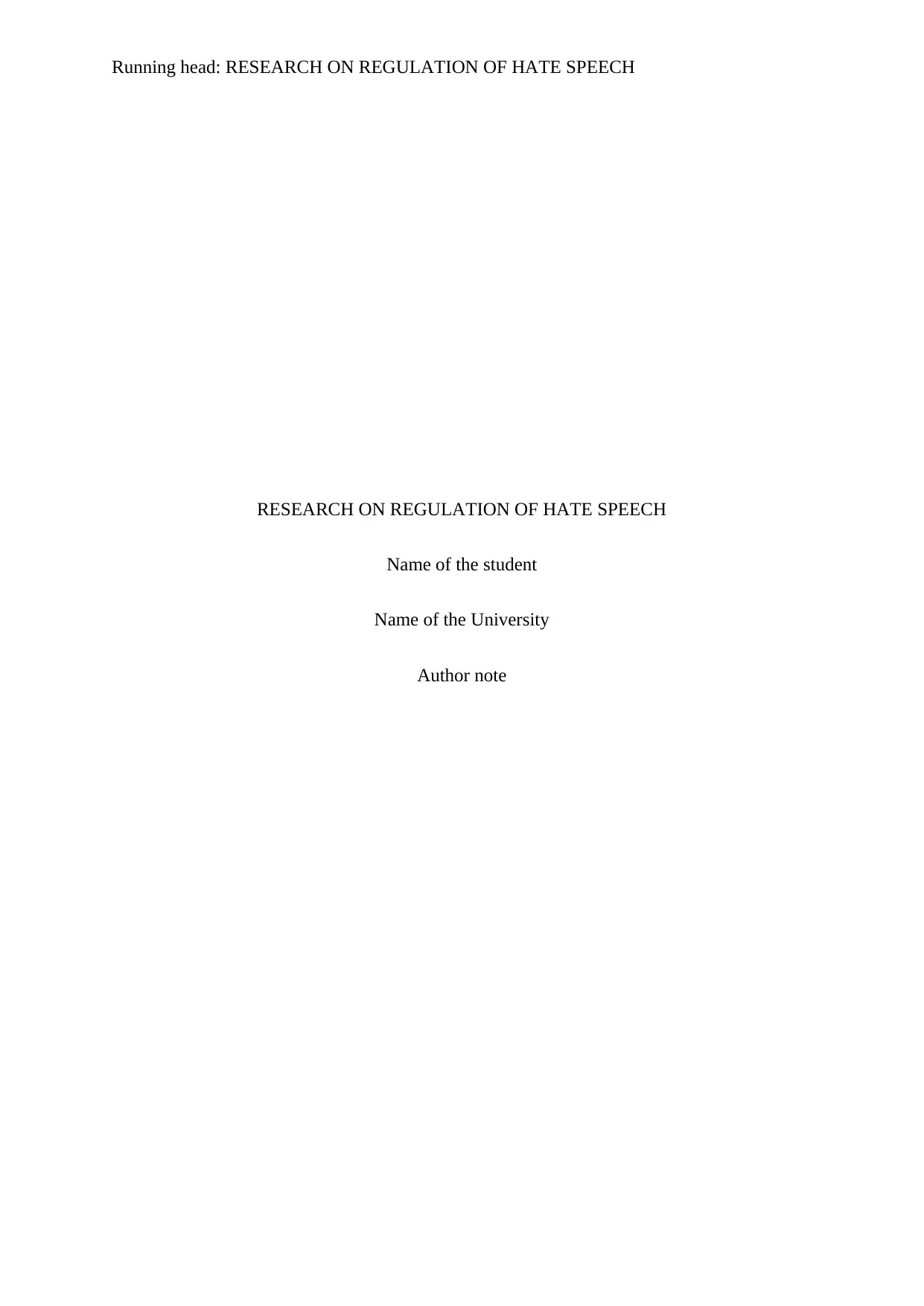
Running head: RESEARCH ON REGULATION OF HATE SPEECH
RESEARCH ON REGULATION OF HATE SPEECH
Name of the student
Name of the University
Author note
RESEARCH ON REGULATION OF HATE SPEECH
Name of the student
Name of the University
Author note
Paraphrase This Document
Need a fresh take? Get an instant paraphrase of this document with our AI Paraphraser
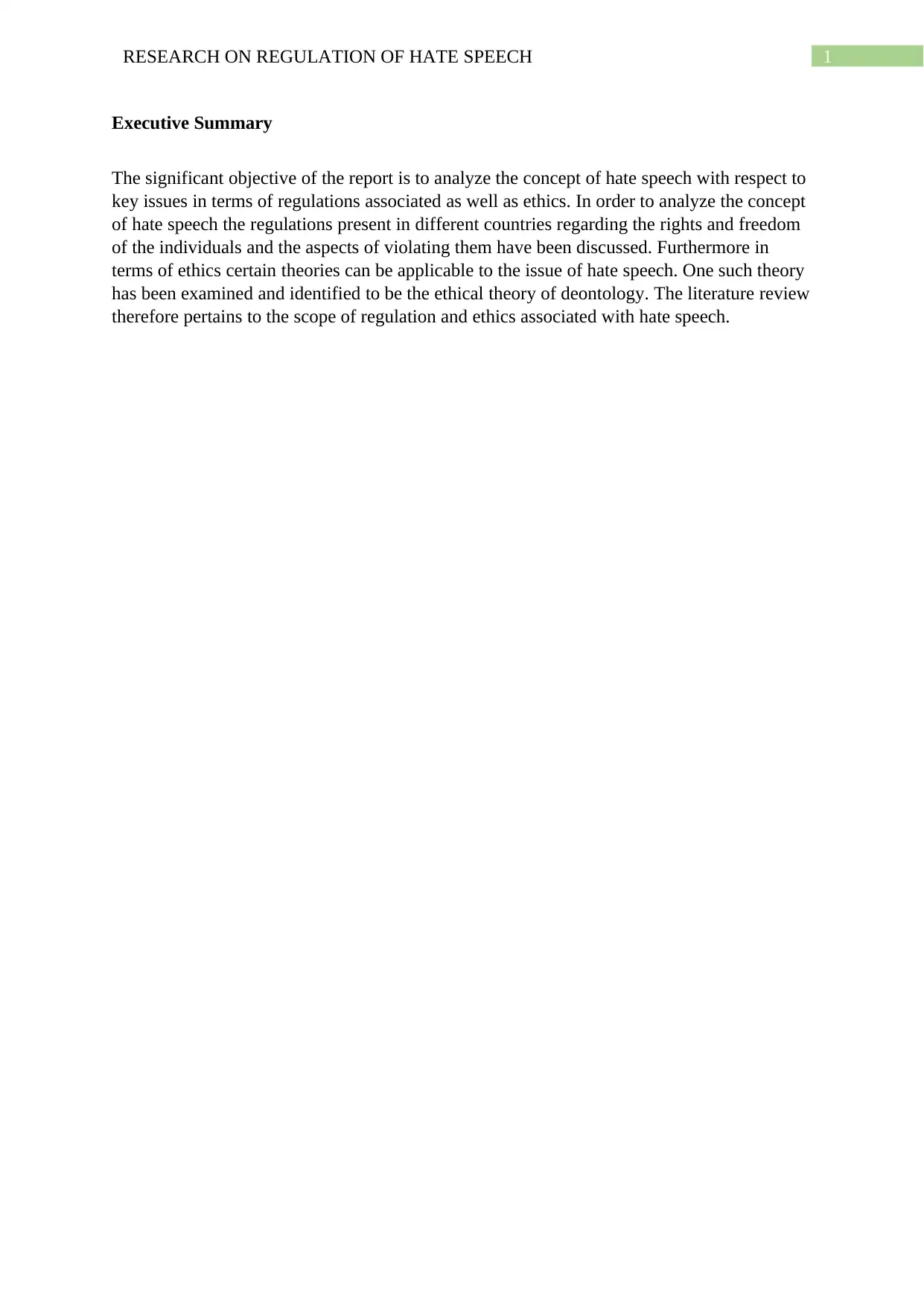
1RESEARCH ON REGULATION OF HATE SPEECH
Executive Summary
The significant objective of the report is to analyze the concept of hate speech with respect to
key issues in terms of regulations associated as well as ethics. In order to analyze the concept
of hate speech the regulations present in different countries regarding the rights and freedom
of the individuals and the aspects of violating them have been discussed. Furthermore in
terms of ethics certain theories can be applicable to the issue of hate speech. One such theory
has been examined and identified to be the ethical theory of deontology. The literature review
therefore pertains to the scope of regulation and ethics associated with hate speech.
Executive Summary
The significant objective of the report is to analyze the concept of hate speech with respect to
key issues in terms of regulations associated as well as ethics. In order to analyze the concept
of hate speech the regulations present in different countries regarding the rights and freedom
of the individuals and the aspects of violating them have been discussed. Furthermore in
terms of ethics certain theories can be applicable to the issue of hate speech. One such theory
has been examined and identified to be the ethical theory of deontology. The literature review
therefore pertains to the scope of regulation and ethics associated with hate speech.
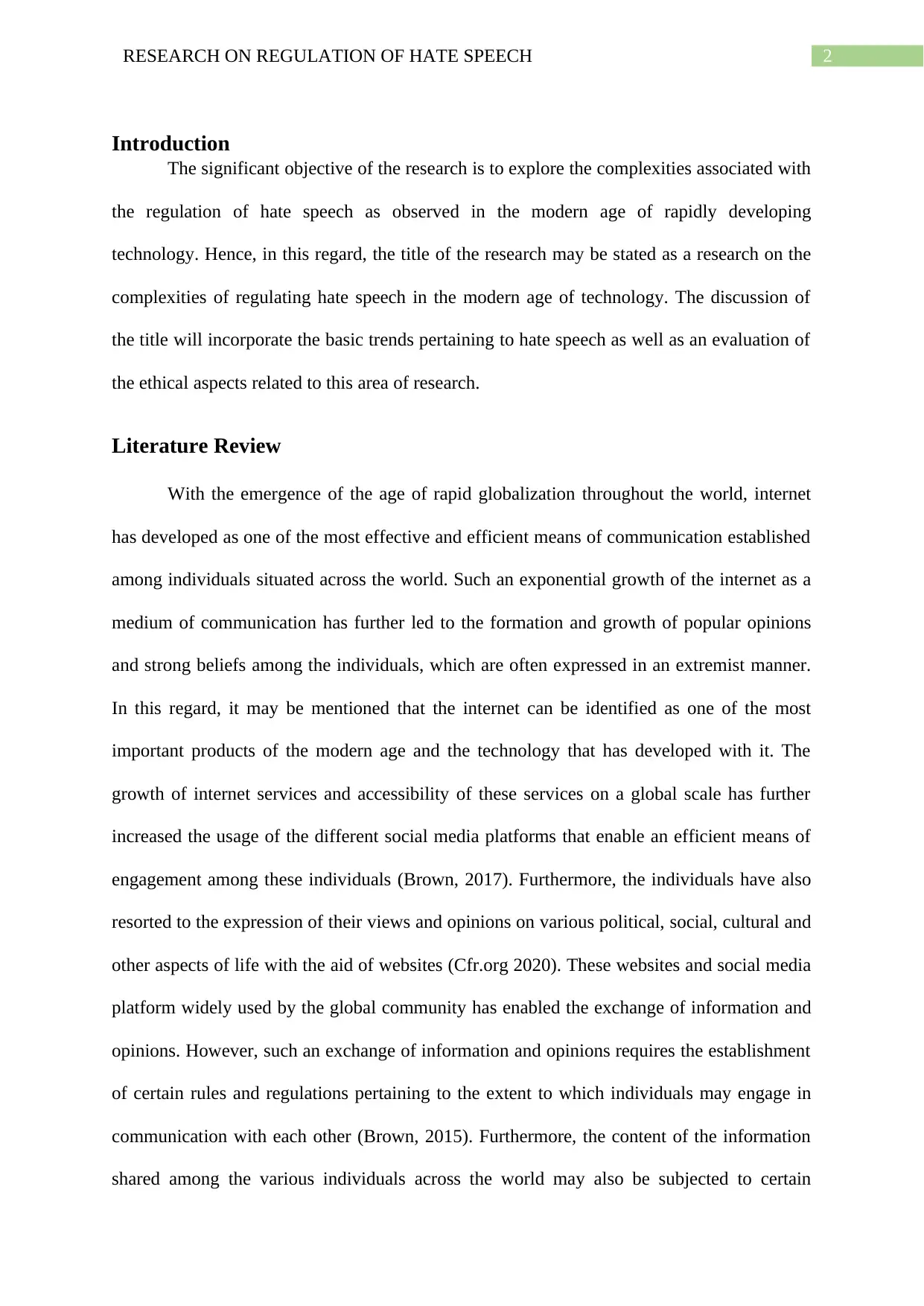
2RESEARCH ON REGULATION OF HATE SPEECH
Introduction
The significant objective of the research is to explore the complexities associated with
the regulation of hate speech as observed in the modern age of rapidly developing
technology. Hence, in this regard, the title of the research may be stated as a research on the
complexities of regulating hate speech in the modern age of technology. The discussion of
the title will incorporate the basic trends pertaining to hate speech as well as an evaluation of
the ethical aspects related to this area of research.
Literature Review
With the emergence of the age of rapid globalization throughout the world, internet
has developed as one of the most effective and efficient means of communication established
among individuals situated across the world. Such an exponential growth of the internet as a
medium of communication has further led to the formation and growth of popular opinions
and strong beliefs among the individuals, which are often expressed in an extremist manner.
In this regard, it may be mentioned that the internet can be identified as one of the most
important products of the modern age and the technology that has developed with it. The
growth of internet services and accessibility of these services on a global scale has further
increased the usage of the different social media platforms that enable an efficient means of
engagement among these individuals (Brown, 2017). Furthermore, the individuals have also
resorted to the expression of their views and opinions on various political, social, cultural and
other aspects of life with the aid of websites (Cfr.org 2020). These websites and social media
platform widely used by the global community has enabled the exchange of information and
opinions. However, such an exchange of information and opinions requires the establishment
of certain rules and regulations pertaining to the extent to which individuals may engage in
communication with each other (Brown, 2015). Furthermore, the content of the information
shared among the various individuals across the world may also be subjected to certain
Introduction
The significant objective of the research is to explore the complexities associated with
the regulation of hate speech as observed in the modern age of rapidly developing
technology. Hence, in this regard, the title of the research may be stated as a research on the
complexities of regulating hate speech in the modern age of technology. The discussion of
the title will incorporate the basic trends pertaining to hate speech as well as an evaluation of
the ethical aspects related to this area of research.
Literature Review
With the emergence of the age of rapid globalization throughout the world, internet
has developed as one of the most effective and efficient means of communication established
among individuals situated across the world. Such an exponential growth of the internet as a
medium of communication has further led to the formation and growth of popular opinions
and strong beliefs among the individuals, which are often expressed in an extremist manner.
In this regard, it may be mentioned that the internet can be identified as one of the most
important products of the modern age and the technology that has developed with it. The
growth of internet services and accessibility of these services on a global scale has further
increased the usage of the different social media platforms that enable an efficient means of
engagement among these individuals (Brown, 2017). Furthermore, the individuals have also
resorted to the expression of their views and opinions on various political, social, cultural and
other aspects of life with the aid of websites (Cfr.org 2020). These websites and social media
platform widely used by the global community has enabled the exchange of information and
opinions. However, such an exchange of information and opinions requires the establishment
of certain rules and regulations pertaining to the extent to which individuals may engage in
communication with each other (Brown, 2015). Furthermore, the content of the information
shared among the various individuals across the world may also be subjected to certain
⊘ This is a preview!⊘
Do you want full access?
Subscribe today to unlock all pages.

Trusted by 1+ million students worldwide
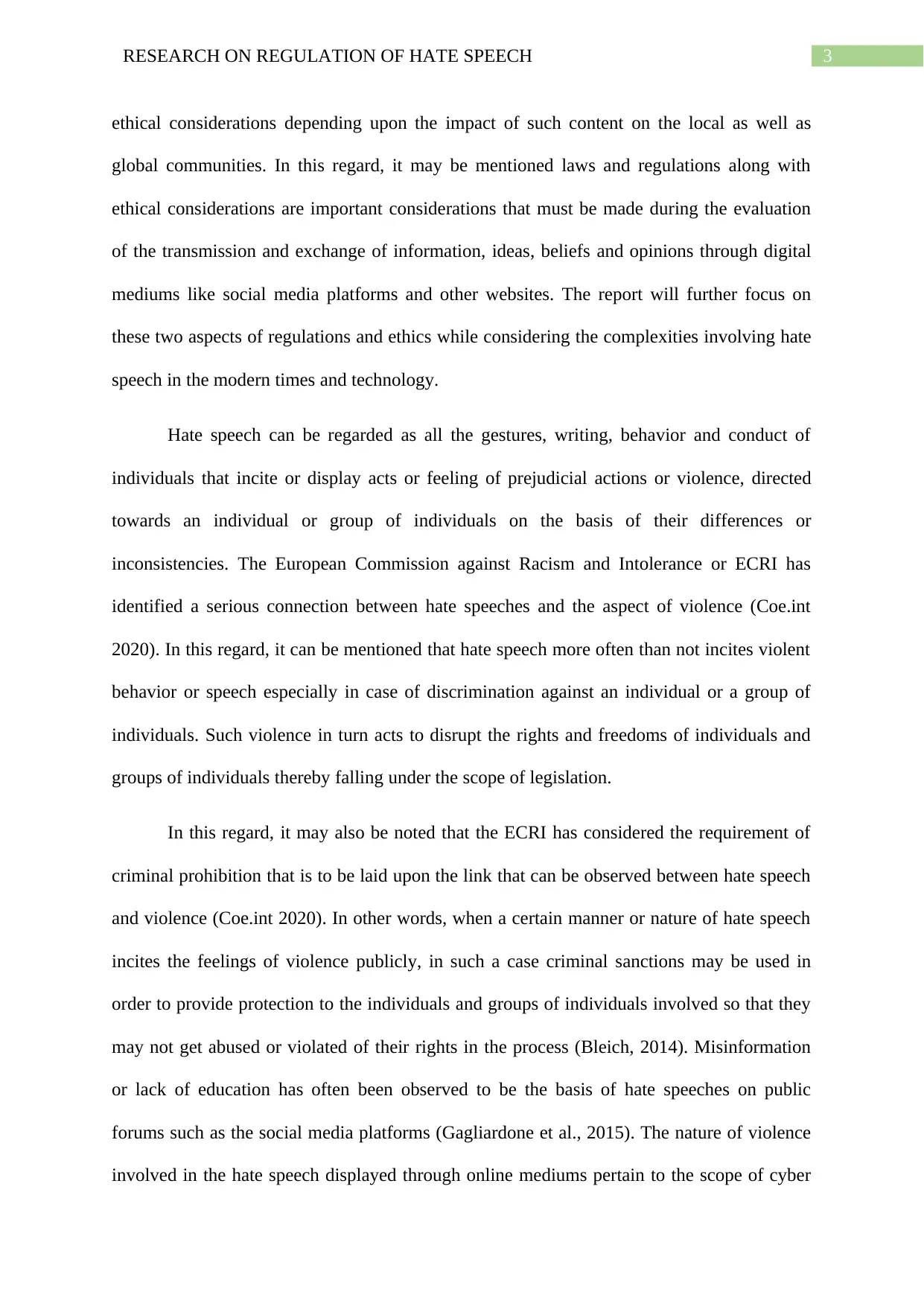
3RESEARCH ON REGULATION OF HATE SPEECH
ethical considerations depending upon the impact of such content on the local as well as
global communities. In this regard, it may be mentioned laws and regulations along with
ethical considerations are important considerations that must be made during the evaluation
of the transmission and exchange of information, ideas, beliefs and opinions through digital
mediums like social media platforms and other websites. The report will further focus on
these two aspects of regulations and ethics while considering the complexities involving hate
speech in the modern times and technology.
Hate speech can be regarded as all the gestures, writing, behavior and conduct of
individuals that incite or display acts or feeling of prejudicial actions or violence, directed
towards an individual or group of individuals on the basis of their differences or
inconsistencies. The European Commission against Racism and Intolerance or ECRI has
identified a serious connection between hate speeches and the aspect of violence (Coe.int
2020). In this regard, it can be mentioned that hate speech more often than not incites violent
behavior or speech especially in case of discrimination against an individual or a group of
individuals. Such violence in turn acts to disrupt the rights and freedoms of individuals and
groups of individuals thereby falling under the scope of legislation.
In this regard, it may also be noted that the ECRI has considered the requirement of
criminal prohibition that is to be laid upon the link that can be observed between hate speech
and violence (Coe.int 2020). In other words, when a certain manner or nature of hate speech
incites the feelings of violence publicly, in such a case criminal sanctions may be used in
order to provide protection to the individuals and groups of individuals involved so that they
may not get abused or violated of their rights in the process (Bleich, 2014). Misinformation
or lack of education has often been observed to be the basis of hate speeches on public
forums such as the social media platforms (Gagliardone et al., 2015). The nature of violence
involved in the hate speech displayed through online mediums pertain to the scope of cyber
ethical considerations depending upon the impact of such content on the local as well as
global communities. In this regard, it may be mentioned laws and regulations along with
ethical considerations are important considerations that must be made during the evaluation
of the transmission and exchange of information, ideas, beliefs and opinions through digital
mediums like social media platforms and other websites. The report will further focus on
these two aspects of regulations and ethics while considering the complexities involving hate
speech in the modern times and technology.
Hate speech can be regarded as all the gestures, writing, behavior and conduct of
individuals that incite or display acts or feeling of prejudicial actions or violence, directed
towards an individual or group of individuals on the basis of their differences or
inconsistencies. The European Commission against Racism and Intolerance or ECRI has
identified a serious connection between hate speeches and the aspect of violence (Coe.int
2020). In this regard, it can be mentioned that hate speech more often than not incites violent
behavior or speech especially in case of discrimination against an individual or a group of
individuals. Such violence in turn acts to disrupt the rights and freedoms of individuals and
groups of individuals thereby falling under the scope of legislation.
In this regard, it may also be noted that the ECRI has considered the requirement of
criminal prohibition that is to be laid upon the link that can be observed between hate speech
and violence (Coe.int 2020). In other words, when a certain manner or nature of hate speech
incites the feelings of violence publicly, in such a case criminal sanctions may be used in
order to provide protection to the individuals and groups of individuals involved so that they
may not get abused or violated of their rights in the process (Bleich, 2014). Misinformation
or lack of education has often been observed to be the basis of hate speeches on public
forums such as the social media platforms (Gagliardone et al., 2015). The nature of violence
involved in the hate speech displayed through online mediums pertain to the scope of cyber
Paraphrase This Document
Need a fresh take? Get an instant paraphrase of this document with our AI Paraphraser
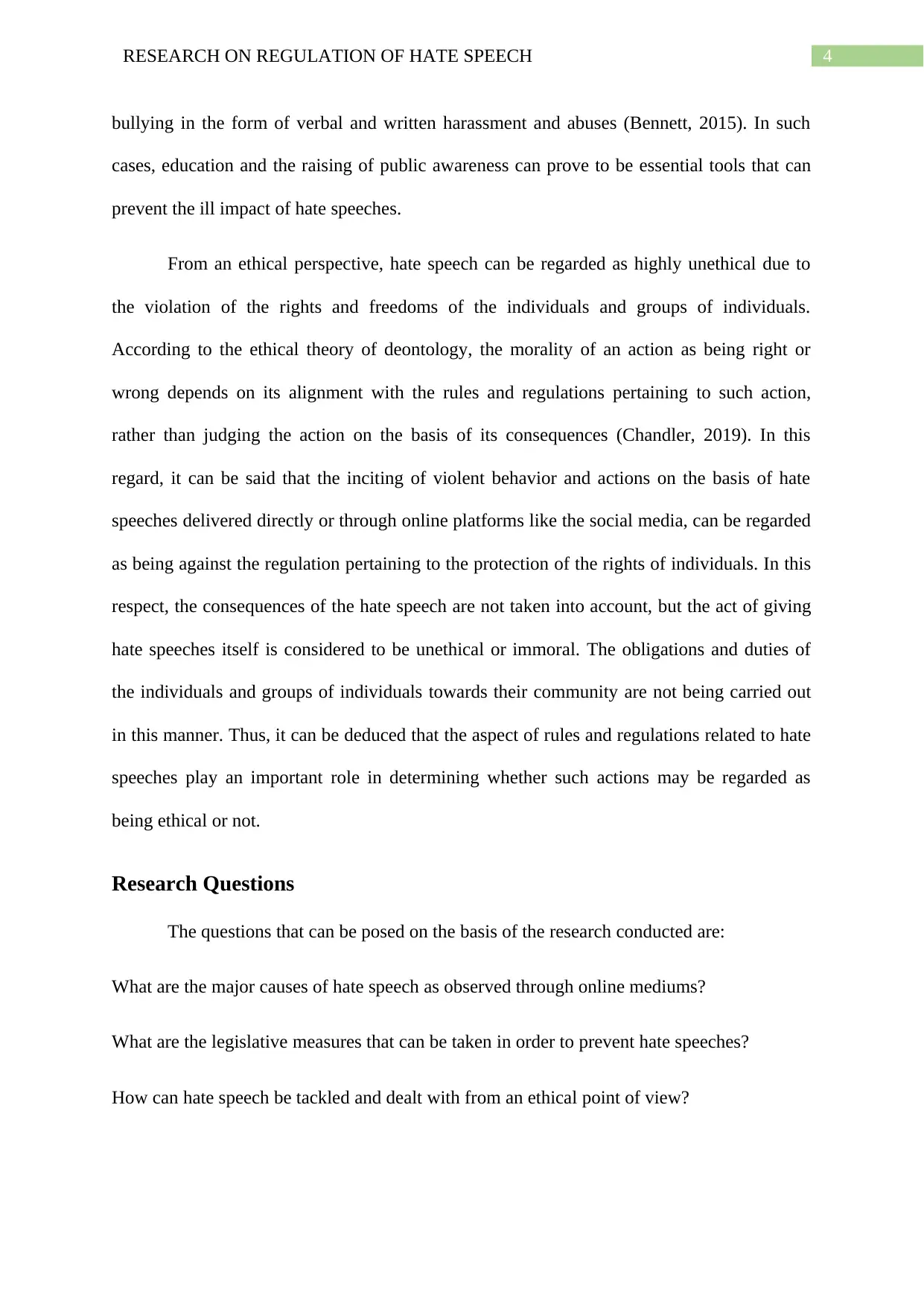
4RESEARCH ON REGULATION OF HATE SPEECH
bullying in the form of verbal and written harassment and abuses (Bennett, 2015). In such
cases, education and the raising of public awareness can prove to be essential tools that can
prevent the ill impact of hate speeches.
From an ethical perspective, hate speech can be regarded as highly unethical due to
the violation of the rights and freedoms of the individuals and groups of individuals.
According to the ethical theory of deontology, the morality of an action as being right or
wrong depends on its alignment with the rules and regulations pertaining to such action,
rather than judging the action on the basis of its consequences (Chandler, 2019). In this
regard, it can be said that the inciting of violent behavior and actions on the basis of hate
speeches delivered directly or through online platforms like the social media, can be regarded
as being against the regulation pertaining to the protection of the rights of individuals. In this
respect, the consequences of the hate speech are not taken into account, but the act of giving
hate speeches itself is considered to be unethical or immoral. The obligations and duties of
the individuals and groups of individuals towards their community are not being carried out
in this manner. Thus, it can be deduced that the aspect of rules and regulations related to hate
speeches play an important role in determining whether such actions may be regarded as
being ethical or not.
Research Questions
The questions that can be posed on the basis of the research conducted are:
What are the major causes of hate speech as observed through online mediums?
What are the legislative measures that can be taken in order to prevent hate speeches?
How can hate speech be tackled and dealt with from an ethical point of view?
bullying in the form of verbal and written harassment and abuses (Bennett, 2015). In such
cases, education and the raising of public awareness can prove to be essential tools that can
prevent the ill impact of hate speeches.
From an ethical perspective, hate speech can be regarded as highly unethical due to
the violation of the rights and freedoms of the individuals and groups of individuals.
According to the ethical theory of deontology, the morality of an action as being right or
wrong depends on its alignment with the rules and regulations pertaining to such action,
rather than judging the action on the basis of its consequences (Chandler, 2019). In this
regard, it can be said that the inciting of violent behavior and actions on the basis of hate
speeches delivered directly or through online platforms like the social media, can be regarded
as being against the regulation pertaining to the protection of the rights of individuals. In this
respect, the consequences of the hate speech are not taken into account, but the act of giving
hate speeches itself is considered to be unethical or immoral. The obligations and duties of
the individuals and groups of individuals towards their community are not being carried out
in this manner. Thus, it can be deduced that the aspect of rules and regulations related to hate
speeches play an important role in determining whether such actions may be regarded as
being ethical or not.
Research Questions
The questions that can be posed on the basis of the research conducted are:
What are the major causes of hate speech as observed through online mediums?
What are the legislative measures that can be taken in order to prevent hate speeches?
How can hate speech be tackled and dealt with from an ethical point of view?
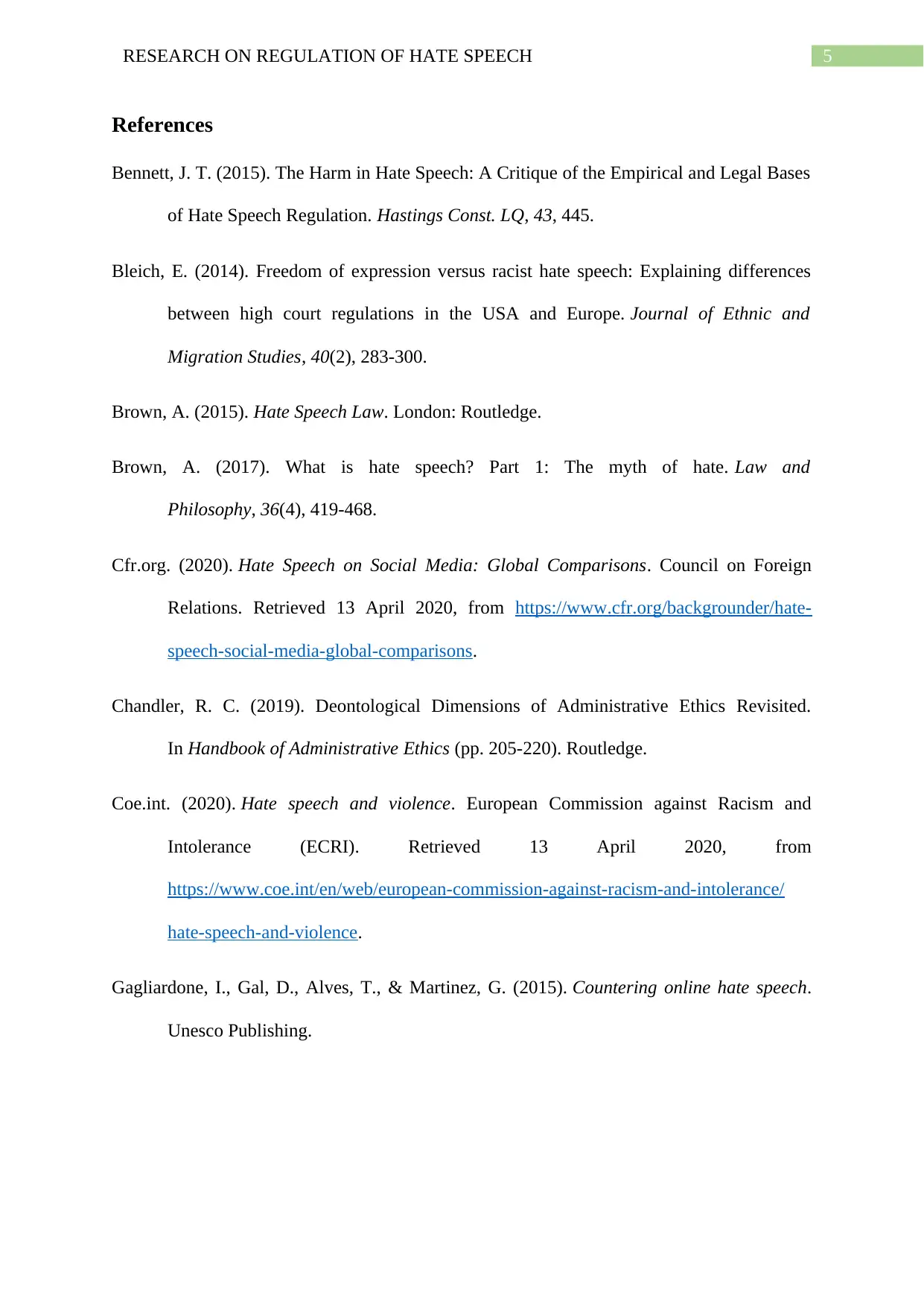
5RESEARCH ON REGULATION OF HATE SPEECH
References
Bennett, J. T. (2015). The Harm in Hate Speech: A Critique of the Empirical and Legal Bases
of Hate Speech Regulation. Hastings Const. LQ, 43, 445.
Bleich, E. (2014). Freedom of expression versus racist hate speech: Explaining differences
between high court regulations in the USA and Europe. Journal of Ethnic and
Migration Studies, 40(2), 283-300.
Brown, A. (2015). Hate Speech Law. London: Routledge.
Brown, A. (2017). What is hate speech? Part 1: The myth of hate. Law and
Philosophy, 36(4), 419-468.
Cfr.org. (2020). Hate Speech on Social Media: Global Comparisons. Council on Foreign
Relations. Retrieved 13 April 2020, from https://www.cfr.org/backgrounder/hate-
speech-social-media-global-comparisons.
Chandler, R. C. (2019). Deontological Dimensions of Administrative Ethics Revisited.
In Handbook of Administrative Ethics (pp. 205-220). Routledge.
Coe.int. (2020). Hate speech and violence. European Commission against Racism and
Intolerance (ECRI). Retrieved 13 April 2020, from
https://www.coe.int/en/web/european-commission-against-racism-and-intolerance/
hate-speech-and-violence.
Gagliardone, I., Gal, D., Alves, T., & Martinez, G. (2015). Countering online hate speech.
Unesco Publishing.
References
Bennett, J. T. (2015). The Harm in Hate Speech: A Critique of the Empirical and Legal Bases
of Hate Speech Regulation. Hastings Const. LQ, 43, 445.
Bleich, E. (2014). Freedom of expression versus racist hate speech: Explaining differences
between high court regulations in the USA and Europe. Journal of Ethnic and
Migration Studies, 40(2), 283-300.
Brown, A. (2015). Hate Speech Law. London: Routledge.
Brown, A. (2017). What is hate speech? Part 1: The myth of hate. Law and
Philosophy, 36(4), 419-468.
Cfr.org. (2020). Hate Speech on Social Media: Global Comparisons. Council on Foreign
Relations. Retrieved 13 April 2020, from https://www.cfr.org/backgrounder/hate-
speech-social-media-global-comparisons.
Chandler, R. C. (2019). Deontological Dimensions of Administrative Ethics Revisited.
In Handbook of Administrative Ethics (pp. 205-220). Routledge.
Coe.int. (2020). Hate speech and violence. European Commission against Racism and
Intolerance (ECRI). Retrieved 13 April 2020, from
https://www.coe.int/en/web/european-commission-against-racism-and-intolerance/
hate-speech-and-violence.
Gagliardone, I., Gal, D., Alves, T., & Martinez, G. (2015). Countering online hate speech.
Unesco Publishing.
⊘ This is a preview!⊘
Do you want full access?
Subscribe today to unlock all pages.

Trusted by 1+ million students worldwide
1 out of 6
Related Documents
Your All-in-One AI-Powered Toolkit for Academic Success.
+13062052269
info@desklib.com
Available 24*7 on WhatsApp / Email
![[object Object]](/_next/static/media/star-bottom.7253800d.svg)
Unlock your academic potential
Copyright © 2020–2026 A2Z Services. All Rights Reserved. Developed and managed by ZUCOL.





